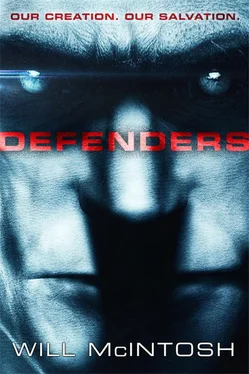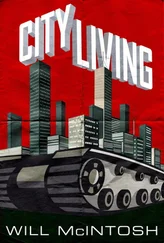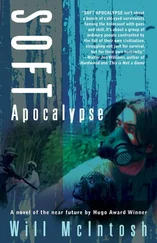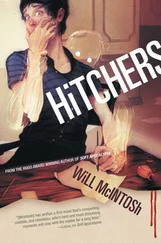They were in modified human Harriers, their massive bodies hanging in harnesses below the craft. Dad was descending, the nose of the ultralight pointed at a steep angle that sent uneasy butterflies through Lila’s gut.
It was hard to tell if the Luyten were dropping to intercept them. If they were, Lila and her father were going to die.
“Oh shit, oh shit, oh shit,” her father was chanting, clearly in shock. Lila gripped the dash, afraid to look for the Luyten. The ground below was a checker of farmland broken by roads and occasionally buildings.
Lila ventured a look up: The Luyten craft were much closer. They were flying in a circular formation, as Luyten always did, closing on them.
“ They’re coming after us! ” Lila screamed.
“I’m gonna ditch us,” Dad said, his chin pressed into his neck, his mouth stretched in a grimace. “Find the—”
Suddenly, Lila was burning. She screamed in pain, the worst of it coming from her fingers, where her rings were searing her skin.
Dad was screaming, too, his fingers sizzling where they gripped the controls. “We lost the engine.” He held fast to the controls, as the ultralight plunged and his fingers burned.
The heat was getting intolerable as the Luyten closed on them. Lila scanned the dash, frantically seeking the crash suit indicator. There was nothing she could see that looked like an emergency icon. Surely all aircraft, no matter how small, were equipped with crash suits.
Then she saw it, down by her dad’s right foot: a square yellow icon with a fold-up ring. She struggled to read the simple, red-ringed instructions: Pull ring out, turn clockwise .
“Wait until we’re close to the ground,” Dad said. “As close as possible.”
“I know !” Lila screamed, trying to concentrate. Her shoes were burning her feet. She kicked them off.
Suddenly the heat let up.
Crying with relief, Lila looked up and back, and spotted the Luyten pulling away.
It was deadly silent save for the whistle of the wind. They were close to the ground, quickly growing closer. Pine trees hurtled by just below. Lila realized they were moving much faster than they seemed.
Her skin was throbbing all over. They’d been just on the edge of the heater’s range. Besides her ring finger and feet, she felt like she had a very bad sunburn.
They cleared the line of trees; Dad tried to bank so they would drop along the length of a cornfield. Lila hadn’t known you could grow corn in Georgia. For some reason the thought made her laugh hysterically. She tried to stifle the laugh, but that only made it worse. They were going down, about to crash, and she couldn’t stop laughing.
The ultralight was canted, the left wing lower than the right. When the left wing was about a dozen feet above the corn, Lila twisted the ring to activate the crash suits.
She had the barest instant to see the ultralight burst apart, then the suit inflated around her, pushing her flat, pinning her arms at her sides. She was turning in the air, head over heels, the blue sky framed inside the tight rectangle of vision the suit afforded, then trees, then the startlingly green cornfield, and blue sky again.
Hitting the ground was much worse than Lila had anticipated. It felt like she was being beaten with a steel bar as she slammed into the ground again and again. Then she rolled and skidded, her momentum carrying her farther than she thought possible.
Finally, she stopped rolling and lay still. She stared up at the sky, the clouds drifting by.
High above, a lone Luyten flew by. Although it was high, it was surely not eight miles high, so it was reading her thoughts at this very moment, perhaps considering whether it was worth the trouble to land and finish them.
It continued on, maybe because they were only civilians, weaponless, lying in a field scattered with wreckage.
“Lila?”
She had no idea how to deactivate a crash suit. When she’d seen them on the news, the people inside were always surrounded by concerned medical personnel who knew how to deflate them.
Lila felt around with her fingers, the only part of her body she could move. They came in contact with a bulb. She squeezed it three or four times, and suddenly the suit hissed and settled around her in a plastic puddle. She pushed it off and struggled to her knees.
Dad was heading toward her, limping deeply, a purple bruise rising on his cheek. “Holy shit,” he said. “Holy shit, Lila.” He looked at his hands: His palms were covered with angry red sores. “Holy shit.”
“Do you know how far we are from Atlanta?” Lila asked.
Dad nodded. “It was in sight when the Luyten showed. Maybe ten or fifteen miles to the suburbs?” He pointed to the right. “The interstate is that way. Maybe we can hitch a ride with some of the refugees.”
Lila struggled to her feet. She expected to feel lancing pain in one limb or another, but besides her burning skin and a lot of soreness and a few bumps and bruises, she was all right.
March 11, 2030 (eight months later). Easter Island.
As they stepped onto the ramp leading off the submarine, Oliver found the fresh, salty breeze delightful. They’d been on the sub for only four days, but it had felt like a month. At first all Oliver could see were the rocks of a jetty. He climbed a ramp, and as he cleared the rise he saw palm trees scattered on an open, rocky plain sloping upward. A handful of horses were grazing in the shadow of a line of a dozen or more enormous stone figures. Oliver recognized the long heads; the sharp, angular, features; the shelflike brows and unreadable expressions.
“Easter Island. Rapa Nui.” He’d always wanted to visit, never found the time.
Off to his left, close to shore, Oliver spotted a group of crisply uniformed officers disappearing down a stairway leading underground. There was no military base on Rapa Nui as far as he knew. It must have been constructed since the invasion. Closer to the water, a large forklift was carrying Five and his entire enclosure. The forklift set Five on a raised platform, which sank slowly into the ground until Five disappeared.
“Dr. Bowen? This way, please.” A woman with gray crewcut hair, wearing a black suit, sidearm, clearly CIA security, touched his elbow. She steered him toward the staircase that led under the island.
Oliver followed the agent down the steps, stunned as the size and scope of this operation unfolded before him. He was descending into an immense open space. The cavernous room was bisected into dozens of smaller spaces, separated by transparent material that gave the facility an unnerving sense of weightlessness. Hundreds of people were visible, hurrying about, seemingly walking on air.
“What is this place?”
“I’m taking you to a briefing, sir,” the agent said.
“It must have cost billions to construct this facility.”
“You’re only seeing a fraction of it. It covers most of the space under the island.”
The far walls were raw stone. Oliver watched as someone stepped onto a small framed platform, grasped the handles jutting from its frame, and shot out of sight. He was led into a room along one wall—one of the few fully enclosed rooms. A thin black woman who looked about sixteen met him at the door.
“Dr. Bowen, I’m Dominique Wiewall. I head up the biological side of the defenders project.” She had a lilting Caribbean accent and spoke quickly, breathlessly. “I’ll be providing your orientation, which, if you don’t mind, I’d like to start straightaway.”
Oliver nodded. “Please, I’m dying to know what’s going on here.”
Wiewall motioned for Oliver to take a seat at a circular meeting table in what looked to be her office. There was a computer station in one corner, a dozen or so small wood carvings of Moai along a single shelf, and a big framed poster of a gorgeous rain forest. Along the bottom of the poster, Island Rain was printed in teal cursive lettering.
Читать дальше












